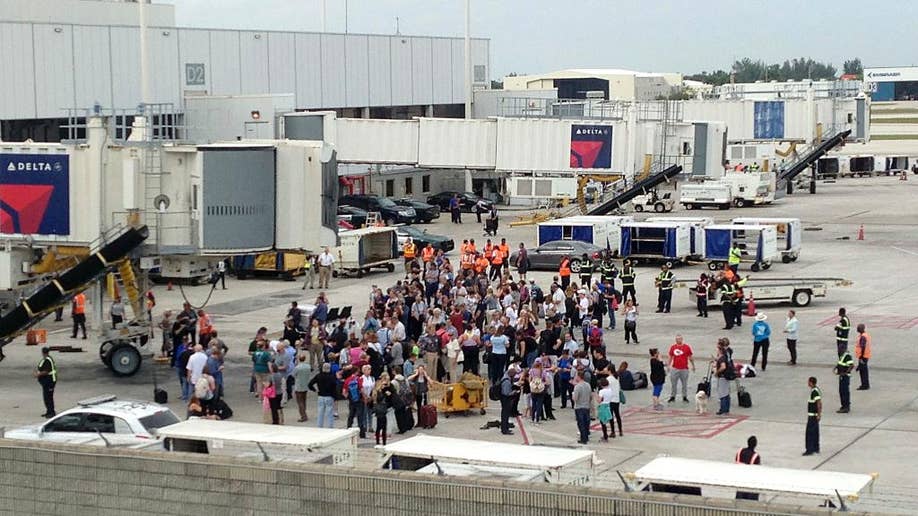Airports, often hailed as gateways to adventure and new experiences, are places where countless journeys begin and end. As we navigate busy terminals and embark on countless flights, we rarely expect to encounter acts of violence. Yet, in a chilling incident that shook the very foundation of travel safety, a man was stabbed twice in the middle of an airport, leaving passengers and authorities reeling in shock and disbelief.

Image: www.foxnews.com
The stabbing, which transpired in broad daylight within the bustling confines of an airport, sent waves of panic and fear through the terminal. It served as a stark reminder that even in seemingly safe environments, danger can lurk around every corner. The incident sparked a flurry of questions about airport security protocols, the escalating trend of violent crime, and the psychological impact such events can have on travelers.
Unveiling the Details: A Glimpse into the Incident
The victim, identified as [name withheld], was reportedly walking through the airport terminal when he was approached by an assailant. The attacker, whose motives remain shrouded in mystery, pulled out a sharp object, likely a knife, and stabbed [name withheld] twice. The violence unfolded in a matter of seconds, leaving bystanders in disbelief and fear. Fortunately, airport security personnel were quickly alerted and rushed to the scene, apprehending the suspect and providing immediate medical attention to the victim.
The airport was promptly placed on lockdown as authorities conducted a thorough investigation. Witnesses described the scene as chaotic, with screams and cries for help echoing through the terminal. The incident disrupted travel schedules, causing delays and cancellations as flights were grounded and passengers were held indefinitely. The incident left a profound impact on the mental wellbeing of travelers, who witnessed or were affected by the harrowing event.
The Aftermath: A Ripple Effect of Trauma and Fear
In the aftermath of the stabbing, the airport community was left grappling with the repercussions of the horrific attack. The victim, suffering from serious injuries, underwent emergency surgery and was hospitalized for an extended period. The incident brought to light the vulnerability of airport security, highlighting the need for enhanced measures to prevent such incidents from occurring in the future.
The airport authorities faced intense scrutiny, with questions raised about the effectiveness of their security protocols. Calls for a comprehensive review of security measures, including increased surveillance, random screenings, and the presence of armed security personnel, intensified. The incident also sparked a national conversation about the rise of violent crime and the need for increased mental health support to address the root causes of such acts.
A Deeper Dive: The Psychological Impact of Violence
Beyond the immediate consequences of the attack, the airport stabbing had a significant psychological impact on those affected. Travelers, witnesses, and airport staff alike experienced a range of emotions, including shock, fear, anxiety, and a sense of vulnerability. The event triggered memories of past traumatic experiences, leading to panic attacks, intrusive thoughts, and difficulty sleeping.
The incident served as a sobering reminder that violence can occur anywhere, at any time. It highlighted the importance of psychological support and coping mechanisms for individuals who experience traumatic events. Airports, often viewed as safe havens, now carried an unsettling air of uncertainty, prompting a reassessment of individual safety and security measures.

Image: www.bbc.co.uk
The Path Forward: Addressing Airport Security and Mental Health
In the wake of the airport stabbing, a collective effort to address the underlying causes of violence and strengthen security measures became a paramount priority. Airport authorities, in collaboration with law enforcement and mental health experts, embarked on a comprehensive review of security protocols. They implemented stricter screening measures, enhanced surveillance systems, and increased the presence of security personnel.
The incident also highlighted the critical need for mental health services to support those affected by violence. Counselors and therapists dedicated to trauma recovery were made available at the airport, providing individuals with a safe space to process their experiences and develop coping mechanisms. The airport community began to prioritize mental well-being, recognizing the profound impact of traumatic events on individual and collective health.
Lessons Learned: A Stronger Call for Safety and Security
The airport stabbing served as a stark reminder of the fragility of safety and security, even in seemingly controlled environments. It prompted a critical reassessment of airport security protocols, leading to the implementation of stricter measures and an increased focus on mental health support for those affected by violence.
The incident also highlighted the importance of community collaboration in addressing violence. By working together, airport authorities, law enforcement, mental health experts, and the community can create a safer and more secure environment for travelers and staff alike. The incident served as a catalyst for change, fostering greater awareness, understanding, and a collective commitment to preventing future acts of violence.
Man Gets Stabbed Twice In The Airport
Conclusion: A Call for Vigilance and Resilience
The airport stabbing is a reminder that even in the busiest of places, we must remain vigilant and prioritize safety. The incident underscores the need for ongoing efforts to enhance security measures, provide mental health support, and foster a culture of awareness and prevention within the airport community. As we navigate the complexities of travel, let us learn from this event and stand united in our commitment to creating a safer and more secure journey for all.






